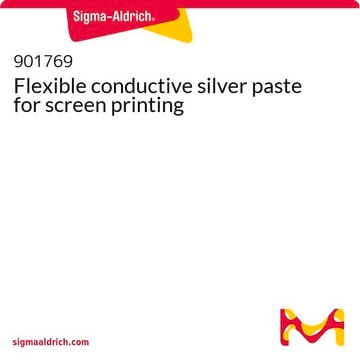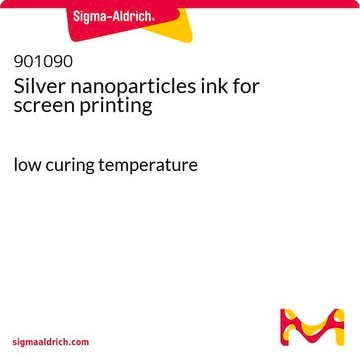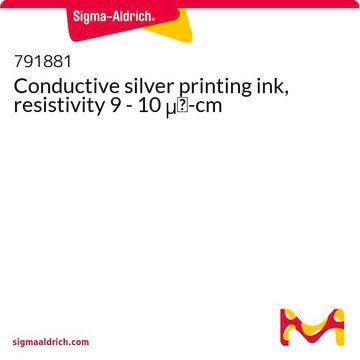735825
Silver
conductive paste
Synonyme(s) :
Silver Paste DGP80 TESM8020
About This Item
Produits recommandés
Forme
paste (microparticles)
Caractéristiques du produit alternatif plus écologique
Design for Energy Efficiency
Learn more about the Principles of Green Chemistry.
sustainability
Greener Alternative Product
Concentration
≥75%
Résistivité
1-3 * 10^-5 Ω-cm (conductive paste)
1.59 μΩ-cm, 20°C
Matrice
α-Terpineol
Taille des particules
200 nm (80%)
<5 nm (20%)
Viscosité
100,000-300,000 cP, 0.4 rpm(25 °C, Brookfield)
Point d'ébullition
2212 °C (lit.)
Pf
960 °C (lit.)
Température de transition
curing temperature 120-150 °C (30-60 min)
Densité
10.49 g/cm3 (lit.)
Autre catégorie plus écologique
, Enabling
Température de stockage
2-8°C
Chaîne SMILES
[Ag]
InChI
1S/Ag
Clé InChI
BQCADISMDOOEFD-UHFFFAOYSA-N
Description générale
Recommended washing solvent = polar solvent (Ethanol, IPA, Methanol, etc)
Recommended substrates = ITO film & glass, plastic film
Application
Informations légales
Mention d'avertissement
Danger
Mentions de danger
Conseils de prudence
Classification des risques
Aquatic Acute 1 - Aquatic Chronic 1 - Eye Dam. 1 - Skin Irrit. 2
Code de la classe de stockage
11 - Combustible Solids
Classe de danger pour l'eau (WGK)
WGK 3
Point d'éclair (°F)
205.0 °F
Point d'éclair (°C)
96.1 °C
Certificats d'analyse (COA)
Recherchez un Certificats d'analyse (COA) en saisissant le numéro de lot du produit. Les numéros de lot figurent sur l'étiquette du produit après les mots "Lot" ou "Batch".
Déjà en possession de ce produit ?
Retrouvez la documentation relative aux produits que vous avez récemment achetés dans la Bibliothèque de documents.
Les clients ont également consulté
Articles
Small molecular weight organic semiconductors are promising for flexible transistor applications in next-gen soft electronics.
The diversity of applications and nanostructured materials accessible using ultrasonic spray methods are highlighted in this article.
While dye sensitization as the basis for color photography has been accepted for a very long time,1 attempts to use this principle for the conversion of solar light to electricity generally had resulted only in very low photocurrents, below 100 nA/cm
Ultrasonic spray pyrolysis produces scalable nanomaterials like metal oxides and quantum dots for diverse applications.
Notre équipe de scientifiques dispose d'une expérience dans tous les secteurs de la recherche, notamment en sciences de la vie, science des matériaux, synthèse chimique, chromatographie, analyse et dans de nombreux autres domaines..
Contacter notre Service technique








